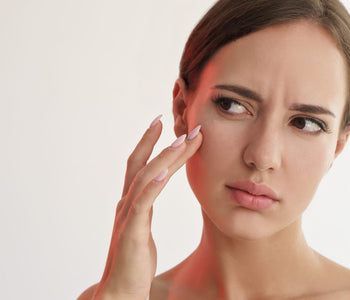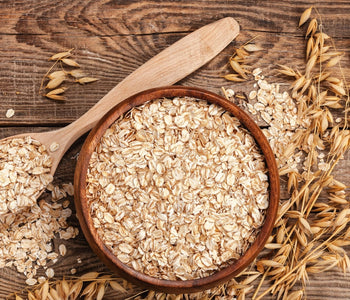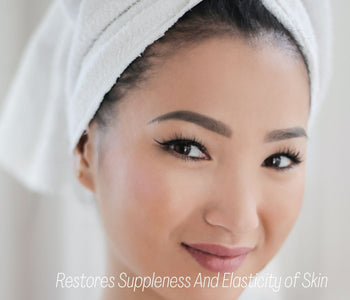Medically reviewed by Minimalist Health Specialist - Written by Viddhi Patel (Journalist) on 11th Mar 2021
The No BS Guide to Using Peptides in Skincare

There is no end to innovation in the skincare industry. All brands seem to be fighting for your attention and twist the narrative each time to seem more appealing.
We're talking about peptides today! This is the ingredient that will target your skincare concerns like Arjuna targeted the fish's eye. Trust me! You want to know about peptides. They will excite and overwhelm you with their abilities. Peptides do not care about your skin type. All they care about is hydrating, plumping, and fighting aging signs.
It is not miraculous, no, but the benefits are enough for you to make it a part of your ritual.
Peptides are gaining popularity due to their ties with collagen, and we all know just how much of a celebrity collagen is. The popular belief is that peptides help preserve and boost collagen levels, triggering anti-aging actions in the skin. But like the good, responsible people we are, we will not accept a popular belief, will we? We will instead know all about it, aLL.
Let's go from the basics to the depths of this protein-boosting ingredient, Peptides.
What are peptides?
Are peptides essential triggers? Yes, triggers, but in a good way since they trigger collagen production in your skin. But to understand this statement fully, we will need to get the science behind it.
Peptides are short chains of amino acids. Now, what are amino acids? Amino acids form proteins that make up our skin and also other organs. Amino acids are critical to our body's health. They stimulate muscle growth, build proteins, regenerate skin cells, and give our immune systems an edge. You can't do without amino acids, literally. These energizing amino acids come together and form short chains. The resultant formation is what we have been chanting for a while now, Peptides. Go a step further, when longer chains are formed of these amino acids, proteins are formed.
The moral of this science being: amino acids and peptides are essential for proteins to form, and these proteins are essential for our organs to form and function.
What peptides do is important here. They ask our cells to make more proteins when the existing ones are breaking down. In essence, peptides nudge our skin to create new collagen and other skin-strengthening proteins like keratin and elastin. The proteins that it triggers in your skin are responsible for its texture, suppleness, flexibility, and vitality. It is noticed that your skin will excel in all these qualities when you let the peptides in your skin.
These powerhouses, called peptides, help your skin achieve that firm, tight, flexible, and hydrated skin that you have been after for so long.
Maintaining the proteins in our skin to keep it intact and firm is important and very hard. It is important because, without collagen, your skin will have no option but to form wrinkles and lose its bounce. And hard because the proteins break down and get produced slowly with age. Environmental aggressors, pollution, and the sun attack our skin, resulting in the breakdown of essential proteins.
So, what we do is we put these peptides on our skin and trick our skin into making more collagen. Serums, moisturizers, masks, and many other skincare products add peptides in their formula.
If you are wondering, why not put the protein (collagen) itself instead of these fragmented bits of it that will then produce collagen? The answer is that long chains of a protein like collagen will not absorb into your skin or get into the deeper, cellular levels of it, so we apply shorter bits that can get absorbed into the skin and do the trick.
How does this powerhouse protein generator benefit your skin?
The list is long, so brace yourselves!
Strengthening your skin barrier
The wall that stands between bacteria, UV rays, pollution, etc., and your delicate skin: your skin barrier gets weakened or damaged. The amping up of skin cells by peptides helps improve your skin barrier. Apart from the skin barrier, peptides help your skin strengthen in general by strengthening the proteins and connective tissues in the dermis. These amped-up strengthening proteins like keratin, elastin, and collagen help your skin recover from any injury and strengthen and maintain its structure.
The Masterstroke- Collagen boost
The protein that we all after, the protein that makes any skincare enthusiast rave, collagen.
Collagen enables your skin to look young and fresh. This is the protein that makes your skin tight, firm, and resilient. We all need a little more collagen in our lives, and we go to great lengths for it. And peptides shorten those lengths through their short amino acid chains that reach the depths of your skin and trigger collagen. Peptides not only stimulate and renew collagen but also decrease its breakdown.
So, now you know why peptides have been the craze; they maintain your young, healthy, and beautiful skin.
Anti-aging star for a reason
Peptides are known for their anti-aging abilities, all thanks to the collagen boost. Collagen makes your skin firm and plump, leaving no room for wrinkles and fine lines. Rebuilding collagen preserves your skin's youthfulness.
Ease up the inflammation
The anti-inflammatory properties of peptides are due to the presence of antioxidants. They repair, calm, and soothe damaged skin.
Will fight acne
Antimicrobial peptides kill acne-causing bacteria, combatting breakouts.
Lock in the Hydration
The reduction of collagen also leads to dehydration, as the structure is too weak to hold in the water. So when you boost your collagen production with peptides, Hydration is a much-needed bonus. Moreover, peptides are smart and serve your skin where there is a need.
If the peptides you applied make your skin dehydrated, it will reassemble itself to hydrate it by producing more water-retaining cells and proteins.
What is even more amazing is that peptides also hyaluronic acid production, the ultra-hydrating substance.
Firmer the skin, the younger it feels
Among the several anti-aging features peptides come with, firm and more elastic skin is one. Peptides keep your skin from going saggy and keep it intact by boosting essential proteins' production, elastin being one of them. They maintain the shape of your skin, making it firmer and tauter.
Soft to touch skin
Peptides improve your skin's texture inflicted with roughness, dryness, discoloration, etc., by UV exposure.
Peptides also heal your skin, and the collagen makes your skin clear, even, and bouncy!
How exactly do these peptides function in your skincare?
Peptides penetrate deeply and send signals to the cells asking them to produce collagen and elastin. The right peptide will target the specific cells and reap the benefits that you are after.
When it comes to the cosmetic arena, the peptides are bifurcated into three broad gorups:
- Signal peptides- The name says it all. These are peptides that send messages to different parts of your skin to promote proteins.
- Carrier peptides- The peptides that transport minerals in the skin, such as copper, boost collagen.
- Neurotransmitter peptides- The ones that block those chemicals from releasing that lead to fine lines. These are the peptides that smooth out wrinkles.
To understand the peptides products you are buying, the following list will help
Copper peptides
Copper peptides moisturize skin by remaining on its surface.
Matrixyl 3000
The peptides will repair collagen proteins in the skin and improve aging signs: fine lines, photoaging, wrinkles.
The multi-peptide serum by Minimalist has 7% matrixyl 3000, and it works exceptionally to smoothen wrinkles, boost moisturization, and increase elasticity in four weeks.
Argireline
Anti Aging peptide restores the firmness in the skin and prevents sagging.
Palmitoyl tripeptides
Anti-inflammatory peptides hydrate the skin and reduce fine lines, wrinkles, and skin damage by the sun and pollution.
Tetrapeptides
Increases skin elasticity, evens out skin tone, reduces discoloration caused by sun, wounds, acne, etc.
What claims are legit and which are not? What does the research say about peptides?
The last 20 years have seen a significant growth of peptides in the anti-aging arena.
A 2008 study used a hydrolyzed keratin peptide and performed vivo long-term studies to evaluate the water barrier function of the skin and determine the elasticity and hydration of the skin. Measurements pointed out that keratin peptides strengthen the skin barrier, improving the skin's ability to hold water.
A recent 2020 open-label study examined women aged less than or equal to 40 years with visibly photoaged skin after applying a serum with l-ascorbic acid USP (15% w/v), tocopheryl acetate USP, and five ppm palmitoyl tripeptide-38 daily for 56 days.
The result is that the serum with antioxidants and matrix-restoring peptides improves skin tone, decreases redness and roughness, and improves radiance, complexion, and wrinkles.
A double-blind clinical study conducted in 2004 evaluated the effect of hexapeptides on wrinkles by examining 20 healthy women from age 40 to 62. They applied 3% of peptide + 1% of booster molecule gel for four weeks and saw a reduction in the length, depth, and the total surface the wrinkles covered. The study shows that the collagen-like peptide works deeply and intensely on wrinkles.
How do I get started with peptides?
Choose a leave-on product. This will give the peptides time to work.
Consider the products that you will use in conjunction with peptides in your routine. The ingredient is quite tolerant and works gracefully with other ingredients, but AHAs will nullify the effect of peptides on your skin, so avoid them.
Niacinamide, vitamin C, hyaluronic acid, and antioxidants are great options to consider adding to your routine, along with peptides.
Once you find your soul peptide serum or cream, apply it twice daily.
While peptides reduce photoaging and sun damage on your skin, it is still necessary to prevent it. Use sunscreen daily.
Some side effects
Unlike other ingredients and actives that boost collagen, peptides do not irritate and are generally safe for all skin types.
So, it's not your skin sensitivity or oiliness that stops you from achieving a firm, youthful skin. It is you.
The ingredient is also safe for pregnant women, but do check with your doctor.
Although safe, certain topical products may cause skin sensitivity, rashes and itching. So, avoid opting for products from shady companies.
A Summary
Although not as gold-standard as retinol, peptides deserve some attention. Peptides, after all, have abilities to target many aging woes, from fine and wrinkles to sagging, and they work out well as our bodies know them.
The right peptide will help you preserve your resilient skin until the biological clock takes over.
Advice By Minimalist
For your cells to act healthy, you need to pay close attention. So, adding peptides to other beneficial ingredients for sun protection will go a long way.
Do not fall for boastful claims of a botox-like transformation. Peptides do not imitate botox effects.
If you cannot tolerate retinoids, peptides are a must. But if you can and are currently using them, peptides will compliment them





